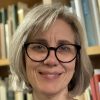This article is more than 5 years old.
I spent last week reliving my grad school days at the University of Virginia by taking a class at Rare Book School. RBS (not to be confused with RBMS, which is the ALA Rare Books and Manuscripts Section) offers a wide variety of weeklong classes, taught by experts in their fields, on everything from medieval paleography to archiving born-digital materials. My class was “Teaching the History of the Book,” taught by RBS director Michael Suarez.
I’ve taken RBS classes before, so I knew that I was in for a fairly intense learning experience. Like most classes, mine had a preliminary reading list. RBS classes meet daily from 8:30-5:00, with evening lectures and events most days. It’s a serious time commitment, but the payoff is the chance to immerse oneself for a week in a topic of interest with a dozen other similarly-obsessed people.
“Teaching the History of the Book” covered exactly what its title implied– theories and methods of teaching book history, descriptive and analytical bibliography, textual criticism, and print culture to students at the undergraduate and graduate level. My classmates were teaching faculty and special collections librarians from a wide variety of institutions. Everyone had slightly different areas of interest and expertise, and the sharing of ideas was invaluable. Class discussions ranged from the highly theoretical (what exactly is Book History anyway?) to the very practical (how do you give undergraduates a basic vocabulary and understanding of descriptive bibliography without overwhelming them?).
I came away with a lot of great ideas, a 1500 page digital coursepack, and a general affirmation of my belief that instruction and outreach is vital in special collections. Michael Suarez is a passionate advocate of the centrality of book history and bibliography to a liberal arts education, and one of his major emphases in the class was our responsibility as educators to pass along an understanding of the importance of book history to our students, fellow faculty, and administrators. The consensus of all the class members was that the only way to do this is to be proactive in creating courses and class sessions, since many faculty and students are highly receptive to ideas of book history but don’t know how to integrate them into the curriculum.
I’m planning to put all this knowledge to good use by developing a LIB200 History of the Book class for spring 2012. This should prove an exciting opportunity to use our Special Collections resources in the classroom in a new and more in-depth way.

3 Comments on ‘Megan at Rare Book School’
Your course sounds exciting Megan- great write-up.
Let me know if i can help you in any way.
That sounds like so much fun Megan!!
I loved reading about your experience at RBS! Can’t wait to hear more as you develop your course.